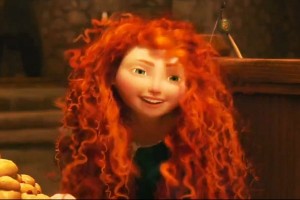Brave
Posted on June 21, 2012 at 6:00 pm
A-| Lowest Recommended Age: | 4th - 6th Grades |
| MPAA Rating: | Rated PG for some scary action and rude humor |
| Profanity: | None |
| Alcohol/ Drugs: | None |
| Violence/ Scariness: | Peril and violence including scary animals with big teeth |
| Diversity Issues: | A theme of the movie |
| Date Released to Theaters: | June 22, 2012 |
| Date Released to DVD: | November 12, 2012 |
| Amazon.com ASIN: | B005LAII08 |
 “Brave” is not just one of the best movies of the year for any age; it is one of the best movies ever made from a female point of view.
“Brave” is not just one of the best movies of the year for any age; it is one of the best movies ever made from a female point of view.
It has been a long time coming. Pixar’s unprecedented series of outstanding critical and audience successes has been justifiably criticized because its leading characters have almost always been white and male. While “The Incredibles,” “Finding Nemo,” and “A Bug’s Life” had important female characters (you might also include “Wall•E”), it was the male characters who were at the center of the story. With its 13th film, Pixar has given not one but two female characters center stage. As we expect from Pixar (well, as we hope, following “Cars 2”), “Brave” is smart, fun, funny, and exciting, with gorgeous settings and endearing characters. But this is something more. It gives us a teenage girl in the leading role who is not pretending to be a boy (“Mulan”), unsure of herself, or trying to attract a boy (just about every movie ever made). She is strong, independent, and completely comfortable with who she is. It’s the rest of the world she thinks needs some change.
Merida (Kelly Macdonald of “Boardwalk Empire” and “Gosford Park”) is a Scottish princess and by tradition, she will marry whichever of the sons of the local lairds bests the others in an athletic competition. But she has no interest in marrying any of them. Her mother (Emma Thompson) makes her dress up in a confining outfit that barely lets her breathe and hides her wild , unmanageable hair. But Merida splits the seams of the dress, takes out her bow, and wins her own hand. In some other movies, that would be the end. Here, it is the beginning. To split the seams of tradition the way she burst through the confines of her regal attire, Merida asks for help from a witch (Julie Walters, Mrs. Weasley in the Harry Potter movies). She says she wants to change her fate. She should have been more specific.
Things go terribly wrong, and soon Merida finds her relationship with her mother turned upside down. Merida learns what it like to have to take care of someone. Her mother has to learn something, too. Their new situation (I am trying not to give too much away here) gives the queen a chance to take a new look at Merida and see how capable and trustworthy she is, while the queen herself begins to lose her connection to civilization. And all of this is in the midst of antics from Merida’s mischievous triplet little brothers, the struggles between the clans, the witch’s travels (her voicemail equivalent is hilarious), and a very scary bear who once took part of Merida’s father’s leg and may be back for more.
Action, comedy, and heart are expertly balanced and the mother-daughter dynamic gives the story a powerful appeal. For me, it felt like a rare chance to hear a story in my native language. There was no need to translate. The wild beauty of the crags and tors of the Scottish landscape provide a bracing environment for Merida’s real and psychological journey with her mother. Merida is a winning heroine who does not define herself by getting or being a boy and it is a pleasure to share her story.
